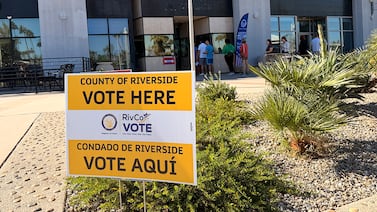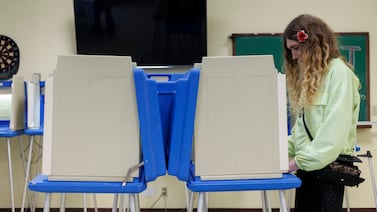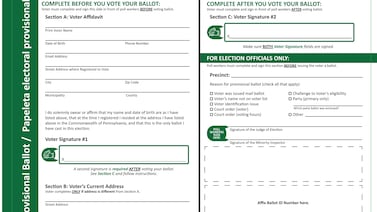Votebeat is a nonprofit news organization reporting on voting access and election administration across the U.S. Sign up for our free newsletters here.
You may be one of the hundreds of thousands of Pennsylvanians who plan to vote by mail during the 2024 election. Or maybe it’s an option you’ve considered but haven’t pursued because you distrust the process or have concerns about fraud.
Pennsylvania election officials have safeguards in place to verify the identity of people who request and cast mail ballots. Many counties also follow guidance from the Department of State to secure ballots and track who handles them.
Despite these layers of security and verification, former President Donald Trump has routinely attacked mail voting since 2020 and falsely claimed in recent months that “you automatically have fraud” with this kind of balloting.
Republicans in recent years have made many efforts to suppress or ban mail voting, which in Pennsylvania is more popular among Democrats. This approach has backfired, and GOP leaders — except for Trump — are now trying to get the party’s voters to embrace this method of voting.
Mail ballot fraud is exceptionally rare, and there is no evidence of widespread issues that would change the outcome of any Pennsylvania election.
Here’s what you need to know about mail voting ahead of the 2024 election:
How Pennsylvania verifies mail ballots
Voters who want to vote by mail in Pennsylvania have two options: absentee ballots and no-excuse ballots.
Absentee ballots are available for voters who will be out of their voting district on Election Day or have a medical condition that prevents them from going to their polling place. To vote this way, a person must list the reason they cannot go to their polling place on their ballot application.
No-excuse mail voting — created when the then-Republican-controlled legislature passed Act 77 in 2019 — doesn’t have this requirement.
Both applications require that voters provide their name and the address where they are registered to vote. The applications also ask for a driver’s license number, identification card number, or the last four digits of the voter’s Social Security number.
This information is then checked against the state’s voter roll to ensure the person applying for a mail ballot is who is registered.
“The ID number they provide is run through the state’s driver’s license database or other databases to see if you can find a person with the same ID number and birth date, so it ties back to a real person,” said Forrest Lehman, Lycoming County’s election director.
How Pennsylvania counts mail ballots
Voters return mail ballots to their county election office, either through the mail, drop box, or by returning them in person to the office.
Once a voter has returned their mail ballot to their county election office, a barcode on the outer envelope is scanned into the state’s voter roll system to record that it has been received. This step also prevents that voter from returning any other mail ballots or voting in person.
Ballots are accepted only if they are sent in an official return envelope and within an inner secrecy envelope. Your county’s election office must receive the ballot by 8 p.m. on Election Day. If a ballot is postmarked on Election Day but not received by the county until after Election Day, it will not be counted.
Election office employees typically organize the returned envelopes containing the ballots by precinct and securely store them in the county election office or an official warehouse.
The ballots are not opened or counted until 7 a.m. on Election Day. County election staff open and count the ballots in front of observers from political parties and campaigns.
Remaining gray areas
Act 77, and mail voting in general, have been subjected to near-constant attacks and litigation since 2020, when the law went into effect. The suits center on various aspects of the law, such as it being silent on some key details, or conflicting with other election rules. Some challenges argue parts of the law are legally unsound.
The courts have resolved some issues. For example, the state Supreme Court ruled in September 2020 that “naked” ballots — those missing a secrecy envelope — must be rejected. That court also unanimously ruled in 2020 that counties could not reject ballots because the voter’s signature on the outer envelope did not match one on file.
Other issues remain as litigation continues to move through the courts and the legislature finds itself at an impasse over additional changes to the law.
Drop boxes
Act 77 is completely silent on drop boxes, which are secure receptacles used to collect mail ballots.
In 2020, the Pennsylvania Democratic Party asked the state Supreme Court to explicitly allow counties to collect mail ballots through drop boxes — a response to a suit from the Trump campaign seeking to have them barred.
The state Supreme Court agreed with the Democratic Party. As a result, some counties offer drop boxes while others don’t, a system that has created a disparity in access across the state.
A voter must return their own ballot unless they have a disability and have filled out paperwork to authorize another person to do so. This rule has created confusion, with some voters, including former First Lady of Pennsylvania Frances Wolf, returning other people’s ballots. Videos of such incidents sparked Republican calls for drop boxes to be banned.
In 2022, the state Senate voted to ban so-called “unsecured ballot drop boxes,” but the bill did not become law. Many counties have voluntarily opted to staff or implement video surveillance of their drop boxes.
Date requirement
Act 77 mandates that voters sign and date the outer envelope for a mail ballot to be counted, but the date requirement has been litigated on the grounds it violates the 1964 Civil Rights Act.
Since 2021, different courts have come to different conclusions.
Most recently, the 3rd U.S. Circuit Court of Appeals ruled the ballots must be properly dated. The decision could result in tens of thousands of ballots being rejected in this year’s election because they lack a date or are misdated.
Voting rights groups have appealed that ruling, but a decision is not expected before the April 23 primary.
Ballot curing
Act 77 does not explicitly state what should happen to a ballot if a voter forgets to sign or date the outer envelope.
As a result, some counties notify voters of these mistakes and give them a chance to rectify them, while others don’t.
The state Supreme Court in 2022 ruled that counties can reach out to voters who made mistakes, inform them of the errors, and allow them to fix them — a process known as “notice and cure.” However, it did not require counties to do so, creating a disparity.
Al Schmidt, Pennsylvania’s top election official, said the Department of State encourages counties to allow voters to fix these mistakes so that their ballots are counted.
Carter Walker is a reporter for Votebeat in partnership with Spotlight PA. Contact Carter at cwalker@votebeat.org.






